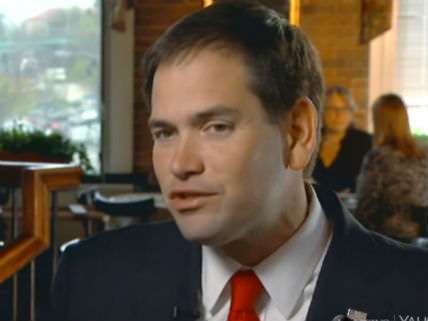Marco Rubio Is Inclined to Raid State-Licensed Marijuana Businesses
The presidential contender says "we need to enforce our federal laws" in states with legal pot.

Marijuana Majority's Tom Angell notes that Chris Christie was not the only Republican candidate who recently indicated that he would try to shut down state-licensed cannabusinesses if elected president. On the same day that talk radio host Hugh Hewitt asked Christie whether he would enforce the federal ban on marijuana against people growing and selling the drug in compliance with state law, he put the same question to Marco Rubio. The Florida senator's response was more ambiguous (or maybe just more confused) than the New Jersey governor's, but it suggested that Rubio would enforce pot prohibition more aggressively than Barack Obama has:
Hewitt: A lot of people are criticizing the President for not enforcing the immigration laws. He's also not enforcing the drug laws in Colorado and Washington State. If you're the president, will you enforce the federal drug laws and shut down the marijuana trade?
Rubio: Yes. Yes, I think, well, I think we need to enforce our federal laws. Now do states have a right to do what they want? They don't agree with it, but they have their rights. But they don't have a right to write federal policy as well….I don't believe we should be in the business of legalizing additional intoxicants in this country for the primary reason that when you legalize something, what you're sending a message to young people is it can't be that bad, because if it was that bad, it wouldn't be legal.
In comparison with Christie, who said he would "crack down and not permit" state legalization of marijuana, Rubio seems to be a bit more concerned about the limits of federal authority, perhaps recognizing that most Republicans, including a substantial share of those who support prohibition, do not think the feds should impose that policy on states that reject it. He is correct that the states do not have the authority to rewrite federal policy, but that does not mean the Justice Department has to step in when states decide to treat marijuana merchants as legitimate businessmen instead of criminals.
For the most part, the DOJ in recent years has been using its broad enforcement discretion in a way that respects such policy choices. Contrary to Hewitt's gloss, that does not mean it is "not enforcing the drug laws in Colorado and Washington State." In addition to enforcing the rest of the Controlled Substances Act, U.S. attorneys are still pursuing marijuana cases in Colorado and Washington, just not in a way that shuts down the state-legal industry. Rubio apparently opposes that policy of prosecutorial forbearance. By contrast, Rand Paul, Ted Cruz, Jeb Bush, and Rick Perry all have said that states should be free to legalize marijuana without interference by the federal government.
Issues of state autonomy aside, Rubio's resort to the same "wrong message" argument that Christie favors suggests he has not given the subject much thought. First of all, it is simply not true that people assume legal substances must be safer than illegal ones. In fact, more than two-thirds of Americans agree with Obama that alcohol, a legal drug, is more dangerous than marijuana, an illegal one. And given the big shifts in attitudes toward tobacco and in smoking prevalence during the last few decades, it is absurd to claim that people do not understand that legal substances can be deadly.
Even if it were true that legal availability implies a drug "can't be that bad," Rubio assumes that using violence against peaceful adults is justified to avoid sending "the wrong message" to teenagers about something they are not supposed to be doing in any case. That proposition is highly debatable, to say the least.


Show Comments (51)